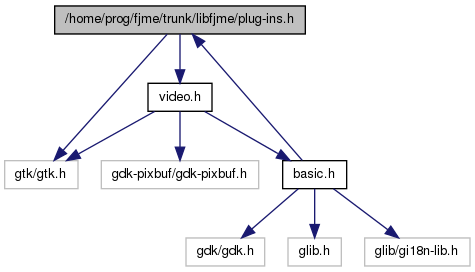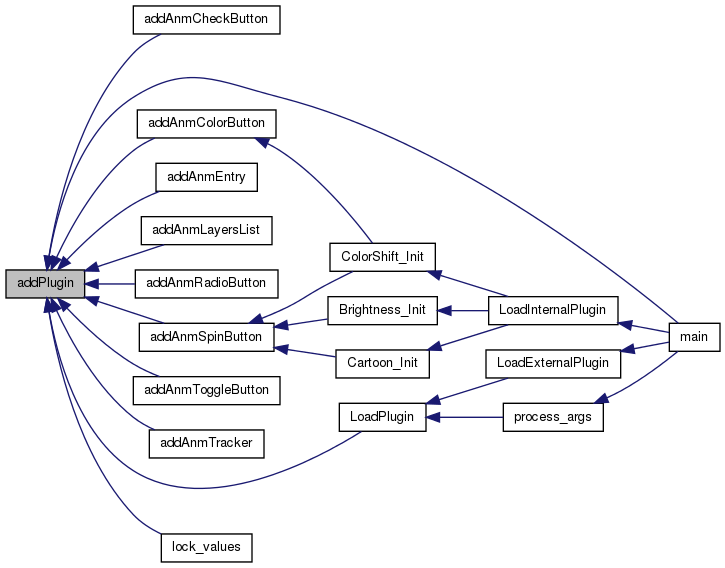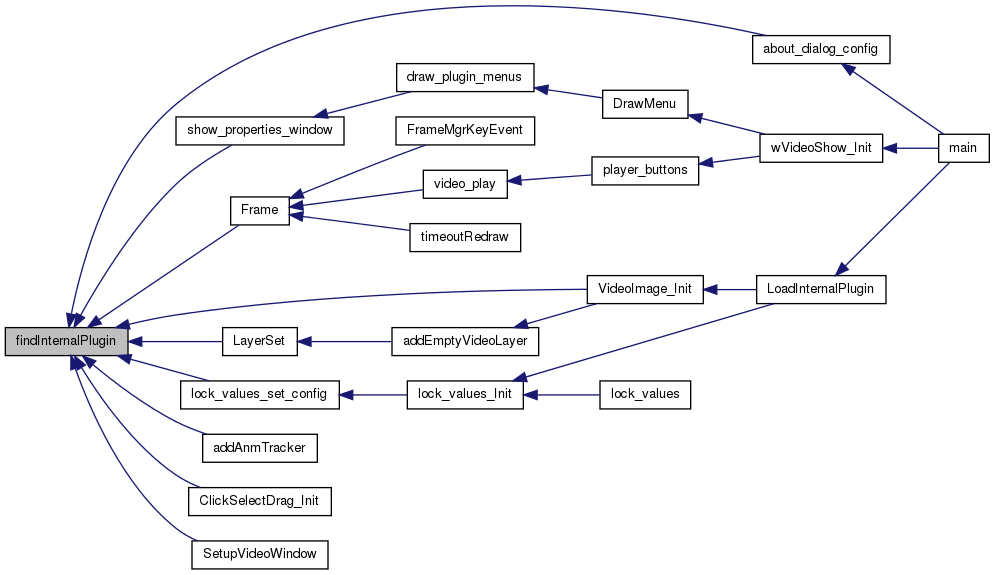 |
FJMovieEditor Pré-Alpha
A GTK video editor for GNOME. Designed for Artists to do, special effects, compositing and animation.
|
 |
FJMovieEditor Pré-Alpha
A GTK video editor for GNOME. Designed for Artists to do, special effects, compositing and animation.
|
The whole system of plugins. More...


Go to the source code of this file.
Data Structures | |
| struct | iPlugin |
| This structure is a generic way to handle plugins. More... | |
Defines | |
| #define | findPluginByName(x) findPlugin( (x), NULL, NULL, NULL, NULL ) |
| Get a iPlugin structure by name. | |
| #define | findPluginByIName(x) findPlugin( NULL, (x), NULL, NULL, NULL ) |
| Get a iPlugin structure by internal name(iname). | |
| #define | findPluginByPath(x) findPlugin( NULL, NULL, (x), NULL, NULL ) |
| Get a iPlugin structure by path. | |
| #define | findPluginByLayer(x) findPlugin( NULL, NULL, NULL, (x), NULL ) |
| Get a iPlugin structure by layer. | |
| #define | findPluginByType(x) findPlugin( NULL, NULL, NULL, NULL, (x) ) |
| Get a iPlugin structure by name. | |
| #define | PLUGIN(x) ((iPlugin*)(x)) |
| Simply cast the specified type to iPlugin. | |
Typedefs | |
| typedef struct iPlugin | iPlugin |
| typedef void(* | PluginCallFunc )(iPlugin *p) |
| A pointer to the type of function used in plugins. | |
Functions | |
| iPlugin * | LoadPlugin (const gchar *file_name, gpointer data) |
| Loads a plugin in dynamic library. | |
| iPlugin * | addPlugin (PluginCallFunc init, PluginCallFunc frame, PluginCallFunc end, gpointer data) |
| Adds an internal plugin. | |
| iPlugin * | addEffect (iPlugin *p, Layer *l) |
| Clones a plugin to be an effect of video. | |
| void | setupEffect (iPlugin *p, Layer *l) |
| GList * | findPlugin (gchar *name, gchar *iname, gchar *path, gchar *layer_name, gchar *type) |
| Returns one, plugin list, matching the search criteria. | |
| iPlugin * | findInternalPlugin (gchar *iname) |
| Looks for a plugin (internal) by the name used internally only. | |
| iPlugin * | findPluginByWidget (GtkWidget *) |
| Search plugin for the pointer to a GtkWidget. | |
| void | delPlugin (iPlugin *p) |
| Delete the plugin causing it can no longer be used by this program. | |
| iPlugin * | addConfig (PluginCallFunc config, PluginCallFunc init, PluginCallFunc frame, PluginCallFunc end, iPlugin *p) |
| Adds a plugin that needs to be configured before. | |
The whole system of plugins.
In a general sense plugins are functions added to the program. Plugins can be internal and external. The internal plugins are functions that are within the program. The external plugins are added as dynamic libraries. Each plugin are assigns a structure iPlugin. Plugins can be graphics. A graphic plugin is nothing more that a plugin that is drawn on the screen. The plugin has a number of variables for this to be possible, a detailed explanation of these variables is given below.
| #define findPluginByIName | ( | x | ) | findPlugin( NULL, (x), NULL, NULL, NULL ) |
Get a iPlugin structure by internal name(iname).
This macro calls the function, findPlugin, so look for a plugin (iPlugin) in the list of plugins, a plugin that the internal name(iname) matches. Returns all plugins with this internal name(iname).
| #define findPluginByLayer | ( | x | ) | findPlugin( NULL, NULL, NULL, (x), NULL ) |
Get a iPlugin structure by layer.
This macro calls the function, findPlugin, so look for a plugin (iPlugin) in the list of plugins, a plugin that the layer name matches. Returns all plugins with this layer name.
| #define findPluginByName | ( | x | ) | findPlugin( (x), NULL, NULL, NULL, NULL ) |
Get a iPlugin structure by name.
This macro calls the function, findPlugin, so look for a plugin (iPlugin) in the list of plugins, a plugin that the name matches. Returns all plugins with this name.
| #define findPluginByPath | ( | x | ) | findPlugin( NULL, NULL, (x), NULL, NULL ) |
Get a iPlugin structure by path.
This macro calls the function, findPlugin, so look for a plugin (iPlugin) in the list of plugins, a plugin that the path matches. Returns all plugins with this path.
| #define findPluginByType | ( | x | ) | findPlugin( NULL, NULL, NULL, NULL, (x) ) |
Get a iPlugin structure by name.
This macro calls the function, findPlugin, so look for a plugin (iPlugin) in the list of plugins, a plugin that the name matches. Returns all plugins with this name.
| #define PLUGIN | ( | x | ) | ((iPlugin*)(x)) |
| typedef void(* PluginCallFunc)(iPlugin *p) |
A pointer to the type of function used in plugins.
| iPlugin* addConfig | ( | PluginCallFunc | config, |
| PluginCallFunc | init, | ||
| PluginCallFunc | frame, | ||
| PluginCallFunc | end, | ||
| iPlugin * | p | ||
| ) |
Adds a plugin that needs to be configured before.
All video effects should be added using this function. This function at present does not call the Init function, but the Setup function, to first configure the plugin. The Init function is only called when the effect of video, is applied to any layer (add effect). When the init function is called, all the data necessary to edit a video, are already set. Prior to the Init function is called, the effect is doubled and applied to a layer.

Clones a plugin to be an effect of video.
The plugin are unique for the entire program, so they are not ready for video effects. A video effect, requires that the same plugin, that is, added to many layers. The ability of a plugin, is a single layer. Because of the plugins are added at the beginning of the program, they can create menu entries, to be called later, but can not be applied to a layer, therefore it may not even exist. In brief:This function clones the plugin, the function calls Init; Causes Frame function is called every frame, set the variable Layer plugin, as the argument layer;

| iPlugin* addPlugin | ( | PluginCallFunc | init, |
| PluginCallFunc | frame, | ||
| PluginCallFunc | end, | ||
| gpointer | data | ||
| ) |
Adds an internal plugin.
This function is made to add a plugin. The Init function is called. This function also adds the plugin, so that the Frame function, is called every frame. End The function is called when the plugin is ready to be deleted, it can, for example, to frred the memory used. The argument called "data", causes the function to configure an existing plugin, where all parameters have already been configured.

| void delPlugin | ( | iPlugin * | p | ) |
Delete the plugin causing it can no longer be used by this program.
| iPlugin* findInternalPlugin | ( | gchar * | iname | ) |
Looks for a plugin (internal) by the name used internally only.
The plugins have several texts (gchar *) contained in them. One is the text, iname (Internal Name). This name is made to internal parts of the program to communicate. Suppose we are working on the basis of, the layers window. We want to add an event to the main video window. How do we find the video window (which is a plugin), among of so many plugins. This is the purpose of the internal name. If the function does not find the plugin returns NULL.

| GList* findPlugin | ( | gchar * | name, |
| gchar * | iname, | ||
| gchar * | path, | ||
| gchar * | layer_name, | ||
| gchar * | type | ||
| ) |
Returns one, plugin list, matching the search criteria.
If you do not need a parameter, leave it as NULL, so that it will be ignored. If not found the searched data, returns NULL.
| iPlugin* findPluginByWidget | ( | GtkWidget * | ) |
Search plugin for the pointer to a GtkWidget.
Within each plugin (iPlugin structure), there is a GtkWidget. You can get the whole plugin, and only, the widget it. Again, if can not find the plugin returns NULL.
| iPlugin* LoadPlugin | ( | const gchar * | file_name, |
| gpointer | data | ||
| ) |
Loads a plugin in dynamic library.
In this function the first argument is the file name, the second a pointer to one, iPlugin structure, existing. The external plugins (dynamic libraries outside the program) are added using this function.

